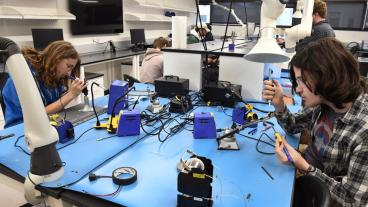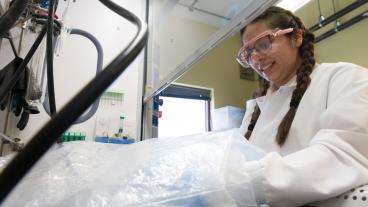A new program at Colorado School of Mines gives students an opportunity to address design challenges faced by local community partners. The Engineering by Doing (EbD) concept was inspired by the College of Engineering and Computational Sciences (CECS) as a way to include project-based learning, research as undergraduates, community and service learning and other active learning experiences.
“We believe students can develop into better engineers if they can get exposure to actual engineering and research practice during their program of study,” CECS Dean Kevin Moore said.
The goal of the program is “to provide Mines students with professional practice experiences as part of their education through ‘Projects that Matter.’” This semester, students in the EbD class are working with International Development Enterprises (iDE), a Denver-based organization that sells irrigation and water storage and sanitation to farmers in poor countries. The project aims to find a solution to help farmers in Burkina Faso and Northern Ghana maintain crops for a longer duration and sell them for a larger profit.
“This can allow their kids to go to school longer, or for them to afford more things,” said Doug Nettles, one of the students taking the class as part of the humanitarian minor. “It could really open up more opportunities for them.”
Professor Jered Dean started the semester by giving groups of students $20 to build a rough prototype of a solution. Senior Nicole Davis and her group created a drying device that used mirrors and the sun.
“I am analyzing the insulating and cooling potential of soil in Ghana,” Davis, also a humanitarian engineer minor, said. “It has been an amazing way to implement the skills I am learning in heat transfer to solve a real-world problem.”
Students regularly visit iDE’s main office at the Posner Center for International Development in Denver. Currently, Mines is the only higher education tenant at the center. Just this past week, iDE won the Global Humanitarian Engineering Award at the Institute of Electrical and Electronics Engineers Global Humanitarian Technology Conference.
iDE Technology and Innovation Group Project Manager Leslie Light said the project idea has been proposed for years at the organization, but no one has fully explored it.
“The students have looked both broadly at different elements associated with crop storage and deeply in terms of the specific challenges for each,” Light said, who will be teaching EbD I "Human Centered Problem Definition" in the spring.
Nettles said working with iDE has given him the freedom to talk with experts who have knowledge or have worked in the food industry.
“We aren't looking things up in books—we are asking real people about real things, because odds are the culture and the crop details about Ghana and Burkina Faso aren't in a book.” Nettles said. “The real data is going to be in the people.”
Last semester, Mines students in the program collaborated with Colorado Aquaponics and Red Rocks Community College (RRCC) pre-engineering students to design and build an aquaponics system for the RRCC greenhouse.
Contact:
Kathleen Morton, Communications Coordinator / 303-273-3088 / KMorton@mines.edu
Karen Gilbert, Director of Public Relations / 303-273-3541 / KGilbert@mines.edu



